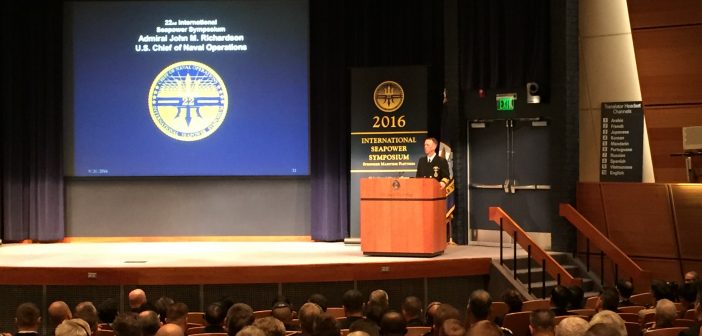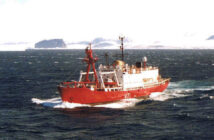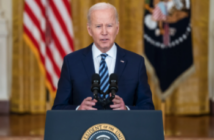Every two years since 1969, the US chief of naval operations has invited his global navy and coast guard counterparts to attend a three-day, closed-door symposium on seapower.
Between Sept. 20-23, representatives from more than 100 nations answered the call from Adm. John Richardson and descended on the Naval War College in Newport, R.I. (We were invited to provide exclusive video coverage of the event.)
At first glance, meetings like these amount to little more than military tourism, junkets for senior leaders and their spouses.
But the reality is: interpersonal relationships are critical among all leaders, especially military ones that hold jobs for a few years at a time. Every little bit helps build a network of bridges for use during future crises when knowing the guy on the other end of the phone makes all the difference. This year, spouses and families were encouraged to attend as well, expanding opportunities for networking beyond those in uniform.
And with maritime trade skyrocketing and the world truly in a “Blue Century,” increased cooperation is vital to cope with tensions in Asia and the High North, climate change that is rising sea levels and changing fisheries worldwide, as well as human migration flows that are straining European governments.
As the chief of the French Navy, Adm. Christophe Prazuck, wisely observed: the symposium is a value because all the navy and coast guard chiefs are in one place for the better part of a week.
During the symposium’s opening ceremony, Richardson made clear the importance of the social dimension of the meeting. The goal was to get top leaders together in one place and talking to one another. That talking will, invariably, lead to working together. And on neutral US turf, neighboring nations that might not consider working together found ways to engage that might not otherwise be the case.
While in Newport – whether in a group or in bilateral meetings – leaders discussed seapower and maritime trends, the environment, new exercises, sought common ground for cooperation and differed sharply on competing territorial claims, especially China’s increasingly assertive behavior in the South China Sea.
And on that score, the universal there was the importance of adhering to international law and norms when it comes to territorial claims and behavior in the region – which was aimed at the senior Chinese admiral who attended to the symposium.
With scores of the most important navies and coast guard’s represented, they were overwhelmingly united in their message that all nations must abide by international law.
As Vice Adm. Tim Barrett, chief of the Royal Australian Navy, said it: “one message, many voices.”
While China is marching to its own beat, as a rising power it wants the perks that come with its growing station. But it is also finding that those perks come with obligations.
While Beijing is vocal about rejecting the international order it had no role in shaping, it is becoming increasingly bound by international accords, whether the UN Convention on the Laws of the Sea, the Arctic Council or the Code for Unplanned Encounters at Sea.
China opposed CUES for a decade before finally joining the 21 nations that adopted the code in 2014 to reduce the possibility of an unplanned incident at sea from escalating into a bigger confrontation.
To be sure, international condemnation hasn’t deterred Beijing from building artificial islands in the South China Sea from which it hopes to project regional power to coerce its neighbors.
But forums like the ISS play a vital role in bringing together nations that see China as an aggressor and telegraphing to Beijing that its actions aren’t winning friends. That diplomatic message must be backed by hard multinational naval capabilities that also serve as a powerful deterrent by making clear that the stakes of unilateral action are far higher than any possible benefit.
In opening this year’s conference, Richardson urged participants to start thinking about how to make the next one in 2018 even better.
And in his closing remarks, he proposed that the next meeting include senior enlisted advisors to better represent the needs and concerns of the sailors they represent and be open to the media, reasoning that nations that spend enormous treasure on their navies and coast guards are obliged to explain why the investment is so vital.
He’s on the right track. At a time when America is questioning its global role and nations worldwide are struggling with the staggering cost of building and maintaining navies and coast guards, leaders have an obligation to tell their stories. They must also work more closely together to address common challenges on the vast oceans vital to the world’s commerce and its very survival.




